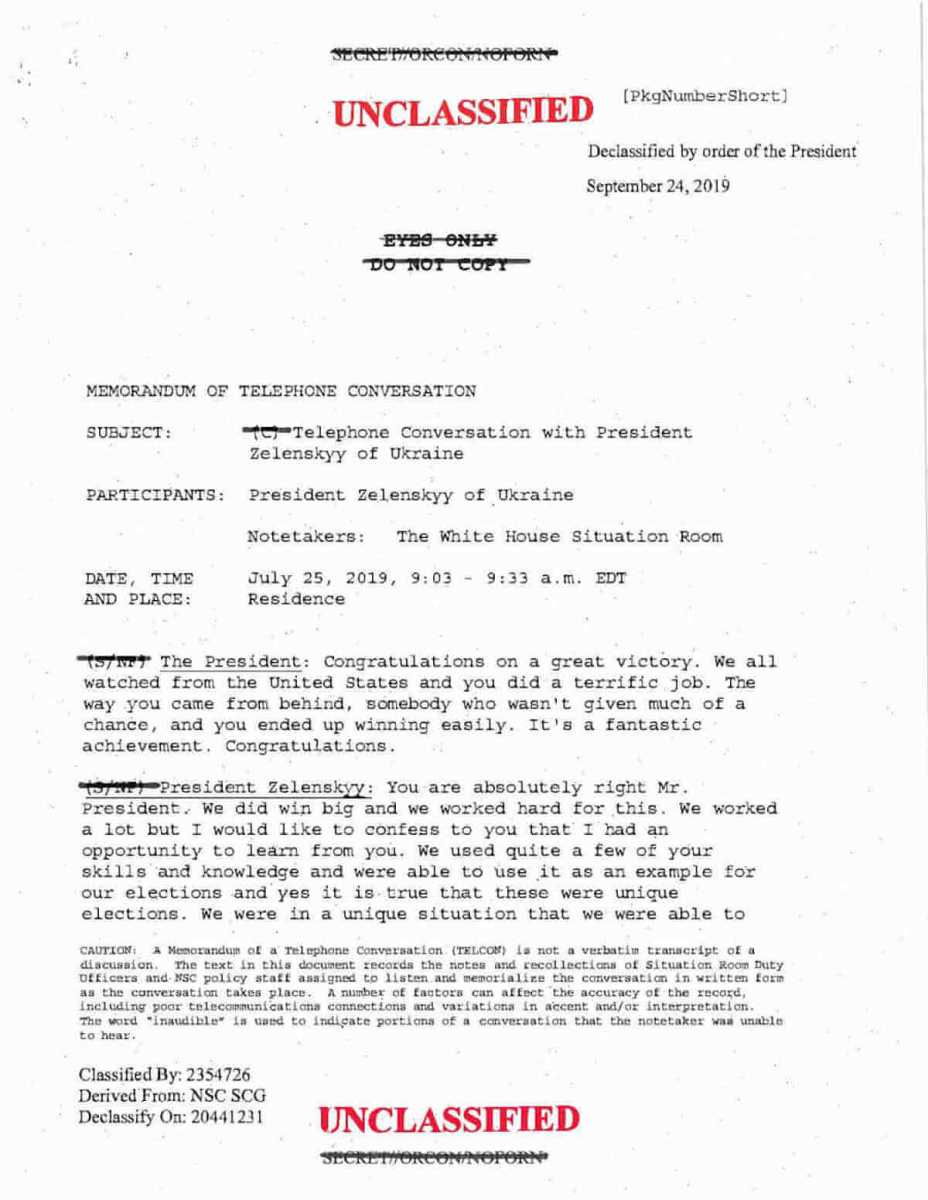After two and a half tumultuous years of the Trump presidency — with significant evidence of campaign finance violations, obstruction of justice, and using the presidency for self-enrichment, among other misdeeds on Donald Trump’s part — we have now arrived at the “smoking gun” moment.
As the result of a whistleblower complaint filed on August 12 by a government intelligence official, Congress and the public got its first inkling of a July phone call Trump placed to Ukraine’s new president, Volodymyr Zelensky, during which he repeatedly pressed him to launch a new investigation into the Hunter Biden’s business dealings in that nation — and what role Joe Biden, when he was vice president, may have played in inappropriately abetting his son’s financial gains.
Let’s get the Biden matter out of the way right away. It’s a red herring. Biden’s intervention in Ukraine was on behalf of President Barack Obama and consistent with the efforts of other Western democracies working to assist that nation in resisting Russian aggression while cleaning its own house. No credible link between the former vice president’s actions there and his son’s business interests has ever been demonstrated.
Trump, as with so many issues, is throwing dust in the air hoping to obscure the ability of Americans to see the true picture. He is trying to smear a Democratic presidential hopeful that he fears could be a formidable 2020 opponent.
(Note: This piece was written before the unclassified version of the whistleblower’s complaint was released by the House Intelligence Committee. The details of that complaint strengthen the case against Trump.)
Enlisting a foreign government to carry out opposition research — indeed a criminal inquiry — into a political rival’s background clearly violates Trump’s oath of office, even if there were not that matter of $390 million in congressionally appropriated military aid being held up by the White House.
In the coming days, all the president’s men and women will be throwing around the term quid pro quo in arguing that Trump, in the transcript summary released September 25, made no direct link between freeing up the money being held back and his request for a “favor.”
This is disingenuous and irrelevant on several levels. First, it’s very clear that the call was all about trading favors. Zelensky thanks Trump for “your great support in the area of defense” and adds, “We are ready to continue to cooperate for the next steps…” Trump immediately follows up by saying, “I would like you to do us a favor though…” and spells out his ask for more investigation into Biden, saying that he will put his personal attorney, Rudy Giuliani, and his attorney general, Bill Barr, in touch to brief the Ukraine president and his prosecutor on what he termed the “horrible” Biden situation. Zelensky responded that his prosecutor “will look into the situation.”
This was a classic shakedown of the new leader of a nation critically dependent on US help by the most powerful person on earth.
If that were not enough, the Washington Post published a story this week on the frantic efforts by administration insiders to get a handle on exactly what Rudy Giuliani — a private citizen who works as Trump’s personal mouthpiece — was up to in Ukraine and why money appropriated to assist Ukraine in fending off Russian aggression, something in the US national security interest, was being withheld.
It wasn’t just administration officials who felt they were in the dark. So, too, did members of Congress. Even as stalwart a Trump defender as South Carolina Senator Lindsey Graham pressed the administration on what the hold-up on the money was. On September 11, after repeated entreaties from members of his own party, Trump finally released it.
It defies reason to come to any other conclusion on what was at play than that Trump was using congressionally authorized funds deemed critical to US interests to exact help from a foreign government to smear a domestic political opponent. That is un-American.
If that seems hyperbolic, read the Washington Post op-ed by seven Democratic members of the House who are military veterans and only came to endorse impeachment this week. They write, “This flagrant disregard for the law cannot stand. To uphold and defend our Constitution, Congress must determine whether the president was indeed willing to use his power and withhold security assistance funds to persuade a foreign country to assist him in an upcoming election.”
Perhaps the most significant reason that the no-quid pro quo defense of Trump is wanting is that we have not yet seen the whistleblower complaint or heard from the whistleblower. The July phone call with Zelensky clearly played into the whistleblower’s concerns, but we need to learn the entire context of events that led that individual to raise “urgent” concerns up the chain of command. From that evidence, we are likely to learn in specific detail why so many within the administration, as the Post reported, were desperate to figure out what Trump and Giuliani were up to and why the money was being held back — and even worked to block the president from picking up the phone to call Zelensky.
(As noted below, the whistleblower complaint has now been released, which states that numerous administration officials were concerned that Trump’s behavior constituted a “serious problem, abuse, or violation of law” that posed “risks to US national security” and constituted “abuse [of] his office for personal gain”; that the administration took steps to “lock down” records of the call by placing them in a computer system intended to store sensitive national security information; and that the new “Ukrainian leadership was led to believe that a meeting or phone call between the President and President Zelensky would depend on whether Zelensky showed willingness to ‘play ball’” on the Biden matter.]
In this regard, it bears remembering that Dan Coats, the director of National Intelligence often reported to be at odds with Trump over his disregard for the work of intelligence professionals, resigned just three days after the whistleblower filed their complaint. Was Coats motivated by the very same concerns? Was Coats the whistleblower? These are questions that need answers.
And impeachment is the vehicle to get at those answers.
We wouldn’t even know what we know so far if not for the threat of impeachment. Despite the obligation of Coats’ acting replacement to turn the whistleblower complaint over to Congress, Joe Maguire instead took Attorney General Barr’s advice to withhold it. Without the unwavering efforts of House Intelligence chair Adam Schiff, the story might never have advanced to where we are today.
This is all of a pattern with Trump. Since the Mueller report found no evidence that he conspired with the Russians in the 2016 election, the president has stonewalled congressional efforts to get to the bottom of the obstruction of justice which the special counsel made abundantly clear Trump tried mightily to carry out. Trump is also, of course, essentially an unindicted co-conspirator in the campaign finance violations that sent his former personal attorney and fixer, Michael Cohen, to jail for three years. And he and his administration have arrogantly dismissed any concerns about the way in which properties owned by Trump are being enriched by both foreign actors and the president’s own traveling team — in violation of two separate emoluments prohibitions in the Constitution.
With these latest revelations — and the shrill assertions by both the president and Giuliani that nothing untoward took place here — Trump is basically defying the law in plain view. Shooting someone on Fifth Avenue, as it were.
The House can’t let him get away with this. And neither can the Senate.


































